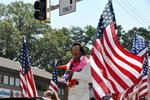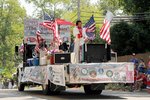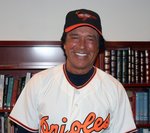 Severna Park
Severna ParkOvercast, 46°
Wind: 0.0 mph, N
 Severna Park
Severna Park



Baltimore Orioles farmhand by age 18, Elvis and Tom Jones cover singer by the age 20, inspiration for a “Bull Durham” movie character by age 39 and currently the CEO of Chesapeake Productions at age 69.
Not even the fictitious Charles Foster Kane juggled as many projects as Greg Arnold, who has lived in Severna Park for the last 23 years.
Now, Arnold is preparing two musicals — “The Kennedy Years” and “The Last Train to Memphis” — to raise money for charity and promote Arginine, an amino acid that he credits with saving his life.
LET’S PLAY BALL
Dubbed the “million-dollar arm with the 10-cent brain,” Arnold signed with the Orioles in 1967 and immediately garnered attention from coaches and the press.
“I was local, I threw a baseball hard and I was what they called a phenomenon,” Arnold said.
George Henderson, godfather to Hall of Famer Brooks Robinson and a man who has spent about 65 years of his life in baseball, said Arnold was one of the top five pitchers he coached, scouted or mentored.
“Among the scouts, he was touted as highly as Jim Palmer,” Henderson said. “He could throw. It was really before radar was out, but he was in the high 90s.”
In the minors, Arnold played with future Orioles like Bobby Grich, Don Baylor and Johnny Oates. He also played with second baseman Ron Shelton, who, unbeknownst to teammates, was taking notes for an eventual script that would become the film “Bull Durham.”
Nuke LaLoosh, portrayed by actor Tim Robbins in “Bull Durham,” was inspired mostly by Arnold.
“I threw the ball all the way up to the press box and that’s how I got the nickname ‘The Nuke,’” Arnold said. “When the ball came up, there was no glass, so the ball just starting bouncing all over the deck. Remember, we were in Vietnam at the time, so someone said it may have been a nuke.”
Another infamous “Bull Durham” scene depicted Kevin Costner’s character sabotaging the field, just another antic for which Arnold confessed.
“I had to pitch the next day, and after the ball game, we all got toasted,” Arnold said. “At 2:00am, I don’t remember if I was talking to Bobby Grich or someone else, but I said, ‘I can’t pitch tomorrow.’ So I went and turned all the sprinklers on.”
Arnold was blessed with athletic talent, but his passion was singing. In 1969, he started booking gigs that allowed him to perform tunes by Elvis and Tom Jones.
During a game with the Orioles’ minor league affiliate Dallas-Fort Worth Spurs in 1970, Arnold punched an umpire and was suspended from baseball for the remainder of the season.
After Orioles general manager Harry Dalton left for a gig with the California Angels, he offered to bring Arnold out west.
“I was going to make $11,000 a year,” he said. “I was making $2,000 a week singing, tax-free.”
Arnold’s once promising baseball career was over in 1971 at the age of 22. “Bull Durham” hit theaters in 1988.
WORKING CLASS HERO
For 12 years, Arnold has presided over Chesapeake Productions. Under that umbrella is the Health Hero Network, which Arnold described as a nonprofit that engages in community service projects and educates the public about healthy living.
“We organized the building of a free handicap ramp for an Anne Arundel County family in need, a single grandmother with a grandson stricken with muscular dystrophy,” Arnold said, citing one example. “His brother had just died from the same disease. We also built him a handicap bathroom complete with a Jacuzzi walk in-tub to help with his disease.”
In 1991, he married his current wife, Mandy, and had his second son. “His whole life, no matter what he was doing in business, he helped whoever didn’t have something,” Mandy said.
Arnold faced his own health crisis in 2007 when he flat-lined after having kidney failure. According to Arnold, his doctors at Johns Hopkins did MRIs and found a double aorta aneurysm.
“That’s like playing Russian roulette with five chambers [loaded] in a gun,” Arnold said.
He went on dialysis and a MRI contrast later showed that his aorta was miraculously healed. Telomeres, caps at the end of DNA strands, are usually short when a person is near death.
“I had half a gallon of vodka and two packs of cigarettes a day for 30 years,” Arnold said. “For me to have any telomeres at all was amazing, and I had the telomeres of a 25-year-old.”
Arnold credited his recovery to “the Hopkins diet,” which is now being marketed as the Arginine Solution.
THE KENNEDY YEARS
Arnold is preparing perhaps his biggest project yet. He plans to organize and star in two musicals: “The Kennedy Years” and “The Last Train to Memphis,” which is more gospel-oriented.
For “The Kennedy Years,” Arnold said the show will feature ‘50s, ‘60s and ‘70s music — from the Beach Boys to Johnny Cash to Glen Campbell — and a comedic storyline that includes biblical characters.
“The storyline deals with drugs, alcohol and faith,” Arnold wrote in a summary. “It will make you cry, it will make you laugh, it will send you messages throughout the scenes. It will make you want to dance and it absolutely makes you sing with Elvis at the end when he sings ‘Day By Day’ from ‘Godspell,’ to the teenager who had asked, ‘How? Can he beat his addictions?’”
The storyline is not the most ambitious part of the project, though. Arnold wants to take his act on the road, from Baker Park in Frederick, Maryland, to the Macy’s Thanksgiving Day Parade in New York.
Arnold said his musicals were designed for Broadway theater but can be adapted for any venue, as evidenced by the scaled-down version of his show during the Severna Park Fourth of July Parade.
He wants to solicit the help of local school and church choirs. He wants to give the proceeds to charity.
“He sees what we go through as a nonprofit with Partners In Care,” Mandy said. “We don’t have a marketing or advertising budget, so he’s doing what he can to bring us that awareness.”
Larry Haught, a longtime friend of Arnold, has known the entertainer since his days dressing in jumpsuits.
“He’ll take the audience and absolutely put them in the palm of his hand,” Haught said. “That’s his calling, you might say. He captured me and never let go.”
Some people will remember Arnold as the wily pitcher who inspired the character of Nuke LaLoosh. He hopes they remember him for his next endeavor as he attempts to capture the attention of audiences nationwide, raise funds for charity and educate people about the Arginine Solution.
“For baseball, it was a failure. For music, it was fun. This, it just happened,” Arnold said. “Can you imagine someone with the audacity and arrogance to say, ‘I want to be in the Macy’s Thanksgiving Day Parade?’”
Comments
No comments on this item Please log in to comment by clicking here